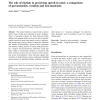Free Online Productivity Tools
i2Speak
i2Symbol
i2OCR
iTex2Img
iWeb2Print
iWeb2Shot
i2Type
iPdf2Split
iPdf2Merge
i2Bopomofo
i2Arabic
i2Style
i2Image
i2PDF
iLatex2Rtf
Sci2ools
CP
2016
Springer
2016
Springer
The role of rhythm in perceiving speech in noise: a comparison of percussionists, vocalists and non-musicians
The natural rhythms of speech help a listener follow what is being said, especially in noisy conditions. There is increasing evidence for links between rhythm abilities and language skills; however, the role of rhythmrelated expertise in perceiving speech in noise is unknown. The present study assesses musical competence (rhythmic and melodic discrimination), speech-in-noise perception and auditory working memory in young adult percussionists, vocalists and non-musicians. Outcomes reveal that better ability to discriminate rhythms is associated with better sentence-in-noise (but not words-in-noise) perception across all participants. These outcomes suggest that sensitivity to rhythm helps a listener understand unfolding speech patterns in degraded listening conditions, and that observations of a ‘‘musician advantage’’ for speech-innoise perception may be mediated in part by superior rhythm skills. Keywords Speech-in-noise perception Á Language Á Music Á Rhythm Á Temporal pr...
| Added | 01 Apr 2016 |
| Updated | 01 Apr 2016 |
| Type | Journal |
| Year | 2016 |
| Where | CP |
| Authors | Jessica Slater, Nina Kraus |
Comments (0)

